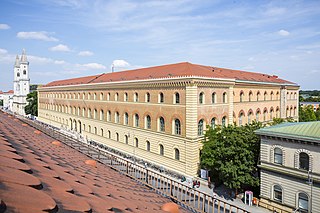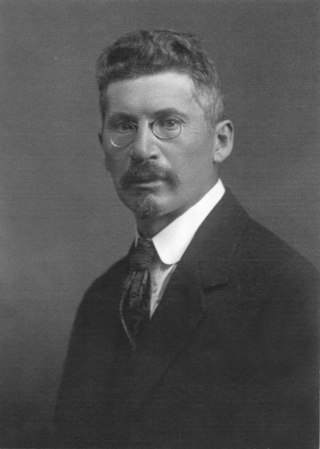
The Bavarian State Library in Munich is the central "Landesbibliothek", i. e. the state library of the Free State of Bavaria, the biggest universal and research library in Germany and one of Europe's most important universal libraries. With its collections currently comprising around 10.89 million books, it ranks among the leading research libraries worldwide. The Bayerische Staatsbibliothek furthermore is Europe's second-largest journals library. Furthermore, its historical holdings encompass one of the most important manuscript collections of the world, the largest collection of incunabula worldwide, as well as numerous further important special collections. Its collection of historical prints before 1850 totals almost one million units.

The Austrian National Library is the largest library in Austria, with more than 12 million items in its various collections. The library is located in the Neue Burg Wing of the Hofburg in center of Vienna. Since 2005, some of the collections have been relocated within the Baroque structure of the Palais Mollard-Clary. Founded by the Habsburgs, the library was originally called the Imperial Court Library ; the change to the current name occurred in 1920, following the end of the Habsburg Monarchy and the proclamation of the Austrian Republic. The library complex includes four museums, as well as multiple special collections and archives.

Nathalie Stutzmann is a French contralto and, in her later career, conductor.

Nina Hoss is a German stage, film and television actress. She is known for her collaborations with director Christian Petzold in films such as Barbara (2012) and Phoenix (2014). In addition, she also performed roles in The White Masai (2005) and The Audition (2019), and Pelican Blood (2020). She has also starred in the American TV series Homeland (2014–2017), The Defeated (2020), and Jack Ryan (2022).

The National Library of Latvia is a national cultural institution under the supervision of the Ministry of Culture of Latvia. Its current main building is known as the Castle of Light. The National Library of Latvia was formed in 1919 after the independent Republic of Latvia was proclaimed in 1918. The first supervisor of the Library was Jānis Misiņš, a librarian and the founder of the Latvian scientific bibliography (1862–1945). The current building was designed in 1989 by noted Latvian-American architect Gunnar Birkerts (1925–2017), who immigrated to the United States and made his career there. It was constructed in the early 21st century and opened in 2014. Today, the Library plays an important role in the development of Latvia's information society, providing Internet access to residents and supporting research and lifelong education.

Europeana is a web portal created by the European Union containing digitised cultural heritage collections of more than 3,000 institutions across Europe. It includes records of over 50 million cultural and scientific artefacts, brought together on a single platform and presented in a variety of ways relevant to modern users. The prototype for Europeana was the European Digital Library Network (EDLnet), launched in 2008.
Johann Sigismund Scholze alias Sperontes was a Silesian music anthologist and poet.

Bernhard Wachstein was a Jewish community historian and bibliographer who rebuilt, expanded, and modernized the library of the Israelitische Kultusgemeinde Wien. He also performed important bibliographic work, particularly relating to the history of Austrian Jews.
The Consortium of European Research Libraries (CERL) is a consortium of research libraries, primarily in Europe, that facilitates access to historians with an interest in the history of the book by providing online resources. The organisation also makes grants to librarians, holds seminars and workshops, and since 1998 has published a periodical called CERL Papers. It was founded in 1992 and since 2021 has been registered in the Republic of Ireland as a company limited by guarantee, based in Dublin.

Monika Grütters is a German politician of the Christian Democratic Union (CDU) who served as Federal Government Commissioner for Culture and the Media in the government of Chancellor Angela Merkel from 2013-2021. She has been a member of the German Bundestag since 2005 and was chairwoman of the Committee on Culture and Media Affairs from 2009 to 2013. Since December 2016, Grütters has also been the chairwoman of the CDU Berlin and an elected member of the CDU Federal Executive Board.
Iris Radisch is a German literature-journalist. Since 1990 she has written for the mass-circulation weekly newspaper, Die Zeit. More recently she has come to wider prominence through her television work.

Hélène Ruiz Fabri is a French jurist and Professor of Law. She was a Director of the Max Planck Institute Luxembourg for Procedural Law until it got closed.

Tabea Rößner is a German journalist and politician of Alliance 90/The Greens who has been serving as a member of the Bundestag since 2009. In 2019, she unsuccessfully ran as the Green Party's candidate for Mayor of Mainz.

Lorna M. Hughes has been Professor in Digital Humanities at the University of Glasgow since 2015. From 2016 to 2019, she oversaw the redevelopment of the Information Studies subject area The re-launch was marked by an international symposium at the University of Glasgow in 2017.
Wilhelm Martin Luther was a German librarian, musicologist and director of the Göttingen State and University Library.

Elisabeth Charlotte Motschmann is a German journalist and politician of the Christian Democratic Union (CDU) who has been serving as a member of the Bundestag from 2013 until 2021. In parliament, she was her party's spokeswoman on media policy.

Frank Scholze is a German librarian. Since January 2020 he serves as the Director General of the German National Library.
Kurt Köster, also spelled Koetser, was a German librarian and historian.
The Association of German Librarians, also known by its German initialism VDB, represents the professional interests of academic librarians and works to promote academic books and libraries. It was founded in 1900, re-founded in 1948 (Munich) and is the oldest librarian association in Germany. The association has more than 1753 members (2020) who are employed in academic library service - or are being trained for it - or who are close to and represent the goals of the association. The office rotates with the respective board and, with the election of library director Anke Berghaus-Sprengel, has been located in Halle (Saale) at the university and State Library of Saxony-Anhalt since August 1, 2021.













